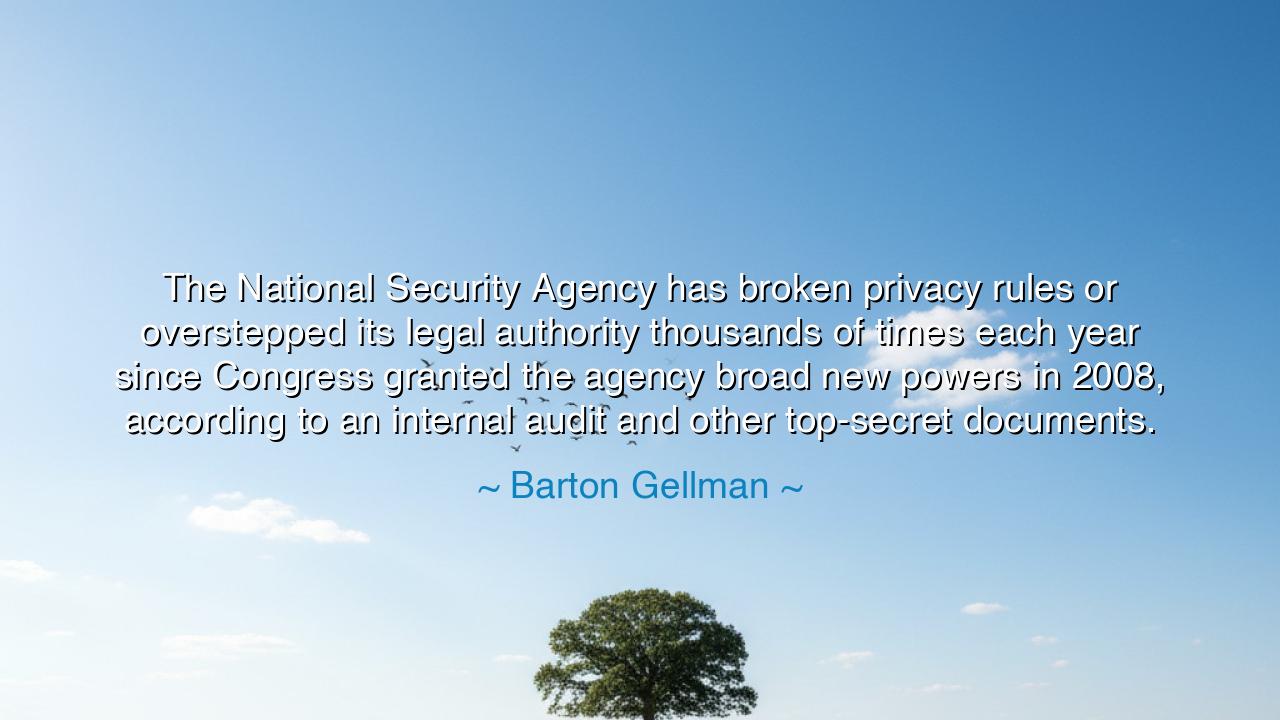
The National Security Agency has broken privacy rules or
The National Security Agency has broken privacy rules or overstepped its legal authority thousands of times each year since Congress granted the agency broad new powers in 2008, according to an internal audit and other top-secret documents.






Hear the warning voice of Barton Gellman, a chronicler of secrets, who declared: “The National Security Agency has broken privacy rules or overstepped its legal authority thousands of times each year since Congress granted the agency broad new powers in 2008, according to an internal audit and other top-secret documents.” In these words lies not merely the tale of an agency, but the eternal story of power, secrecy, and the fragile balance between liberty and control. For when men grant vast powers in the name of safety, those powers, if unguarded, may turn inward and devour the very freedoms they were meant to protect.
He speaks first of privacy rules, the sacred boundaries that shield the individual from intrusion. Privacy is not a luxury; it is the fortress of the soul. Without it, no thought is safe, no word is free, no life is truly one’s own. When these rules are broken, even by those sworn to protect the nation, the covenant between the citizen and the state begins to crumble. For a government that sees all, hears all, and records all may claim security, but it offers chains instead of trust.
Gellman reveals that this was not a matter of rare mistake but of thousands of violations each year. Here is the grave truth: what begins as exception becomes routine, and what is justified as necessity becomes habit. The power to watch, once granted, is seldom surrendered. In the name of fighting enemies abroad, the state turned its gaze inward, forgetting that the people are not the enemy. Thus the guardians of freedom risked becoming its violators, cloaking excess in the mantle of legality.
History offers us mirrors of this danger. In the twilight of the Roman Republic, the Senate granted extraordinary powers to consuls in times of crisis, hoping to preserve order. But once men like Sulla and Caesar held such powers, they found little reason to relinquish them. What had been temporary became permanent; what had been lawful emergency became tyranny. Rome, like our own time, learned that broad powers without restraint corrode the very foundations of liberty.
The deeper meaning of Gellman’s words is that secrecy breeds abuse. When the actions of rulers are hidden, when oversight is weak, and when fear is used to silence dissent, the people’s freedoms are eroded piece by piece. The cloak of “national security” may conceal not only the plans of enemies but also the errors, excesses, and injustices of those in power. It is not the exposure of secrets that endangers freedom—it is their concealment. For sunlight is the ally of liberty, but darkness nourishes oppression.
What lesson must future generations carry from this teaching? It is this: guard your freedoms even from those who claim to protect them. Demand transparency, for power without accountability will always overstep. Do not trade liberty for the illusion of safety, for a people watched at all times are not safe, but enslaved. Be vigilant not only against enemies abroad, but against the slow erosion of rights at home. Remember that laws must bind rulers as well as citizens, lest the law itself be turned inside out.
And to you, listener of these words, I say: awaken your conscience. Read, question, and speak. Support those who shine light upon secrecy, even when their revelations are uncomfortable. Defend the balance between safety and freedom, for once liberty is lost, it rarely returns. Teach your children that vigilance is the price of democracy, and that silence in the face of overreach is complicity.
Thus let Barton Gellman’s warning endure: when guardians break their own rules, freedom itself is at risk. Do not sleep while the fortress of privacy is dismantled stone by stone. Stand watch, demand accountability, and remember always that liberty, once surrendered, is seldom regained. For the fate of nations depends not on the power of armies, but on the courage of citizens to defend the sanctity of their own freedoms.






AAdministratorAdministrator
Welcome, honored guests. Please leave a comment, we will respond soon